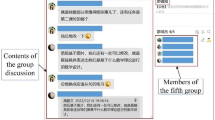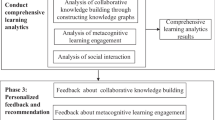Abstract
Online environments are regarded as well constructed to support collaborative and social learning. This research investigates small group collaboration and learning in the context of online exams. Incorporating constructivism and collaborative learning theories, the online Collaborative Exam features students’ active participation in various phases of the exam process through small group activities. The online Participatory Exam features similar processes except that students participate in the exam individually. A large scale field experiment was conducted to compare the two exam structures in terms of learning strategies and exam outcomes. Results show that students in the collaborative exam adopted significantly higher levels of social engagement than those in the participatory exam, learned from other students, and formed a sense of learning community. Areas for future research are briefly discussed.
Preview
Unable to display preview. Download preview PDF.
Similar content being viewed by others
References
Dewey, J.: Experience and Education. MacMillan Press, New York (1963)
Vygotsky, L.: Thought and Language. MIT Press, Cambridge, MA (1962)
Hiltz, S.R.: The Virtual Classroom: Using Computer-Mediated Communication for University Teaching. Journal of Communication 36, 95–104 (1986)
Harasim, L.: On-Line Education: Perspectives on a New Environment. Praeger, New York (1990)
Swan, K., Shea, P.J.: The Development of Virtual Learning Communities," in Learning Together Online. In: Hiltz, S.R., Goldman, R. (eds.) Research on Asynchronous Learning Networks, Lawrence Erlbaum Associates, Mahwah, NJ (2005)
Alavi, M., Dufner, D.: Technology-Mediated Collaborative Learning: A Research Perspective, in Learning Together Online. In: Hiltz, S.R., Goldman, R. (eds.) Research on Asynchronous Learning Networks, Lawrence Erlbaum Associates, Mahwah, NJ (2004)
Hiltz, S.R., Goldman, R.: Learning Together Online. In: Research on Asynchronous Learning Networks, Lawrence Erlbaum Associates, Mahwah, NJ (2004)
Kwok, R.C.W., Ma, J.: Use of a Group Support System for Collaborative Assessment. Computers & Education 32, 109–125 (1999)
Wilson, E.V.: Examnet Asynchronous Learning Network: Augmenting Face-to-Face Course with Student-Developed Exam Questions. Computers & Education 42, 87–107 (2004)
Shindler, J.: Examining the Soundness of Collaborative Essay Exams in Teacher Education Courses, National Forum of Teacher Education Journal 12 (2003)
Shindler, J.V.: Greater Than the Sum of the Parts? Examining the Soundness of Collaborative Exams in Teacher Education Courses. Innovative Higher Education 28, 273 (2004)
Simkin, M.G.: An Experimental Study of the Effectiveness of Collaborative Testing in an Entry-Level Computer Programming Class. Journal of Information Systems Education 16, 273–280 (2005)
Falchikov, N., Goldfinch, J.: Student Peer Assessment in Higher Education: A Meta-Analysis Comparing Peer and Teacher Marks. Review of Educational Research 70, 287–322 (2000)
Sluijsmans, D.M.A., Brand-Gruwel, S., Van Merriënboer, J., Bastiaens, T.R.: The Training of Peer Assessment Skills to Promote the Development of Reflection Skills in Teacher Education. Studies in Educational Evaluation 29, 23–42 (2003)
Topping, K.J.: Peer Assessment between Students in College and University. Review of Educational Research 68, 249–276 (1998)
Tang, C.: Effects of Different Assessment Procedures on Tertiary Students’ Approaches to Studying, Unpublished PhD Thesis. The University of Hong Kong (1991)
Tang, C.: Effects of Modes of Assessment on Students’ Preparation Strategies. In: Gibbs, G. (ed.) Improving Student Learning - Theory and Practice, Oxford Center for Staff Development, Oxford (1994)
Slavin, R.E.: Cooperative Learning: Theory, Research and Practice. Prentice Hall, Englewood Cliffs, NJ (1990)
Bruffee, K.A.: Collaborative Learning: Higher Education. In: Interdependence and the Authority of Knowledge, 2nd edn., John Hopkins University Press, Baltimore, MD (1999)
Bloom, B.: A Taxonomy of Educational Objectives: The Classification of Educational Goals. D. McKay Co, New York (1956)
Pimmel, R.L.: A Practical Approach for Converting Group Assignments into Team Projects. IEEE Transactions on Education 46, 273–282 (2003)
Hathorn, L.G., Ingram, A.L.: Cooperation and Collaboration Using Computer-Mediated Communication. Journal of Educational Computing Research 26, 325–347 (2002)
Paulsen, D.: Leadership Essentials: Racilitation Skills for Improving Group Effectiveness, In: Proceedings of the 32nd annual ACM SIGUCCS conference on User services (October 2004)
Author information
Authors and Affiliations
Editor information
Rights and permissions
Copyright information
© 2007 Springer-Verlag Berlin Heidelberg
About this paper
Cite this paper
Shen, J., Hiltz, S.R., Bieber, M. (2007). Group Collaboration and Learning Through Online Assessments: Comparison of Collaborative and Participatory Online Exams. In: Jacko, J.A. (eds) Human-Computer Interaction. HCI Applications and Services. HCI 2007. Lecture Notes in Computer Science, vol 4553. Springer, Berlin, Heidelberg. https://doi.org/10.1007/978-3-540-73111-5_38
Download citation
DOI: https://doi.org/10.1007/978-3-540-73111-5_38
Publisher Name: Springer, Berlin, Heidelberg
Print ISBN: 978-3-540-73109-2
Online ISBN: 978-3-540-73111-5
eBook Packages: Computer ScienceComputer Science (R0)




